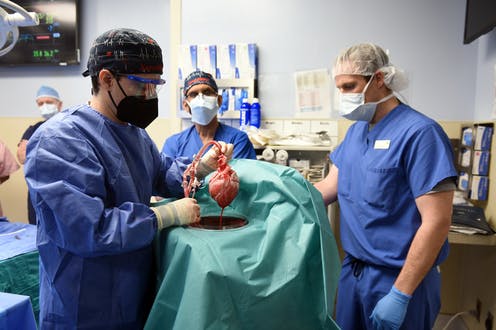
The recent world-first heart transplant from a genetically modified pig to a human generated both headlines and ethical questions.
Many of those questions related to the ethics of xenotransplantation. This is the technical term for organ transplants between species. There has been research into this for more than a century, but recent scientific developments involving genetic modifications of animals to stop the organ being rejected appear to make this much more feasible.
Typical questions about xenotransplantation relate to the risks (for example, of transmitting infection), treatment of the animals, and the ethics of genetic modification of animals for this purpose.
But after the recent heart transplant, there were additional questions that had nothing to do with the donor and were all to do with the recipient of the pig heart.
In that case, the recipient, David Bennett, a 57-year-old man from Maryland, had been terminally ill with severe heart failure and had ended up on an artificial heart machine. He was not eligible for a conventional heart transplant – several centres had already declined to put him on their waiting list for a transplant – but he was offered the experimental option of a genetically modified pig heart.
After news of the transplant broke, it transpired that 33 years earlier Bennett had been convicted of stabbing a man (Edward Schumaker) in a bar and had been sentenced to ten years in jail. Schumaker had been left in a wheelchair and died of a stroke 19 years later.
Schumaker’s older sister has since expressed her wish that the heart had gone to “a deserving recipient”. This has reopened a debate on whether those convicted of serious offences should be eligible for organ transplants.
Strict criteria
This is not a new ethical question, and similar debates in the past have largely been settled by the courts and the medical establishment.
There is a serious shortfall of organs for transplantation. Because of that, there is a need to have strict criteria for eligibility and a transparent ethical process for deciding how to allocate organs once they become available. Typically, those criteria are based on medical factors that predict both the need of the recipient (what is the chance that they will die soon without a transplant) and the benefit of the organ (how likely is the transplant to work and last). Indeed, it was these sorts of factors that made Bennett ineligible for a conventional heart transplant.
But usually transplantation programmes do not pay any attention to the factor that Schumaker’s sister mentioned. They do not exclude convicted felons, even those who are still imprisoned. Guidance from the US organ transplantation network UNOS says that “status as a prisoner should not preclude [someone] from consideration for a transplant”.
One reason for this arises from a key ethical principle in medical care – that treatment should be allocated equitably. Doctors are not qualified to distinguish “sinners from saints”, nor do we think they should be deciding which patients are more deserving.
Decisions about how best to punish someone convicted of a crime are assessed in a totally different domain – the courts, where of course there are careful rules and procedures for assessing whether a person is guilty of a particular offence and what the consequence should be. It would be possible for a country to decide that as a punishment for a particularly severe offence, someone should not be eligible for certain scarce or expensive publicly funded medical treatments. In a number of countries, prison healthcare is underfunded and limited – for example, in the Philippines. However, UN rules on the treatment of prisoners – the so-called Nelson Mandela Rules – state that prisoners should have access to the same standards of healthcare as are available in the community.
In the US, an influential 1976 supreme court decision held that it would be “cruel and unusual punishment” to withhold medical treatment from prisoners. In the UK, prisoners have full access to NHS medical treatment.
Even if there were reduced priority for treatment for prisoners, a separate reason might be thought to apply in Bennett’s case. Since he had served his sentence many years previously, it would be unfair to continue to discriminate against him for medical treatment. Although it is understandable if a victim’s family feel differently, most of us think that people who have completed their sentence should be treated fairly and given an opportunity to return to a normal life.
In fact, the nature of this new development in transplantation might, in one way, diminish such ethical concerns. One key reason why difficult questions about organ allocation arise is because there is a shortage of organs – 470 people died in the UK last year waiting for a transplant. If xenotransplantation does become a realistic option, it may avoid the difficult problem of having to pick and choose between patients with organ failure.
![]()
Dominic Wilkinson receives funding from the Wellcome Trust.























